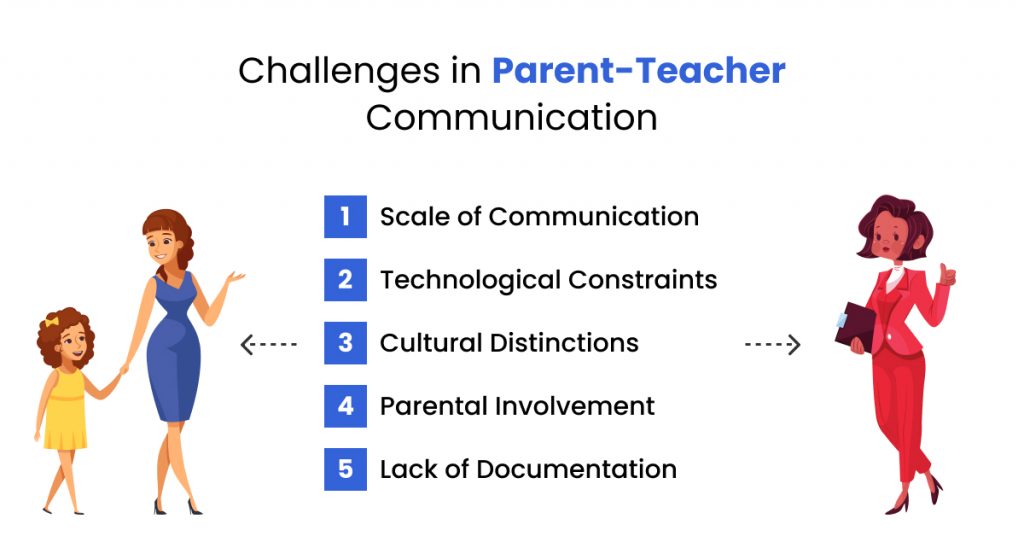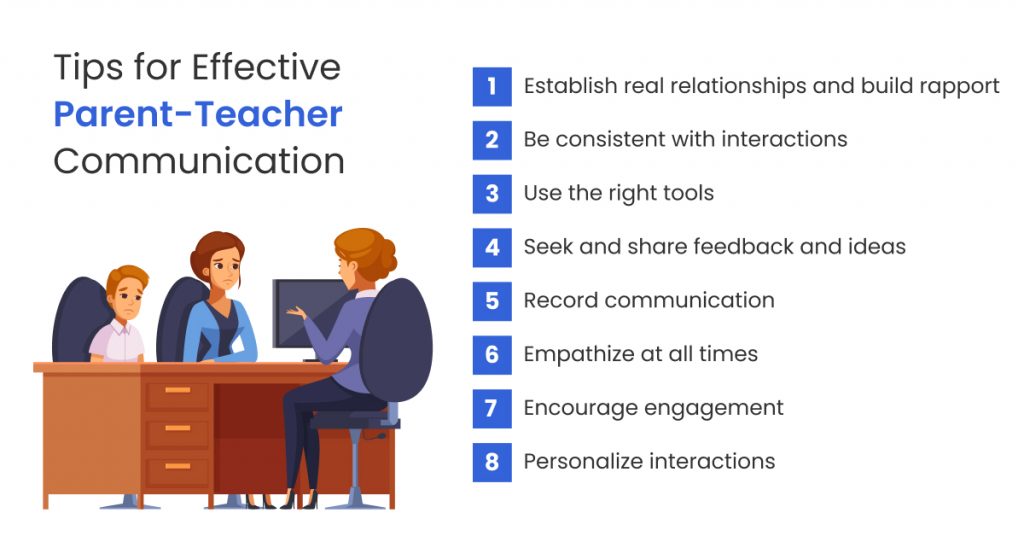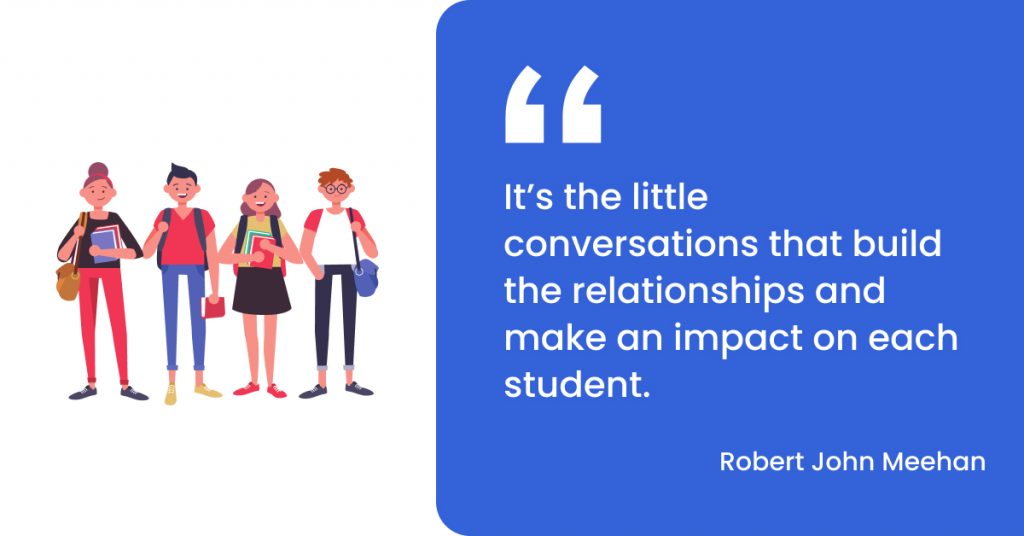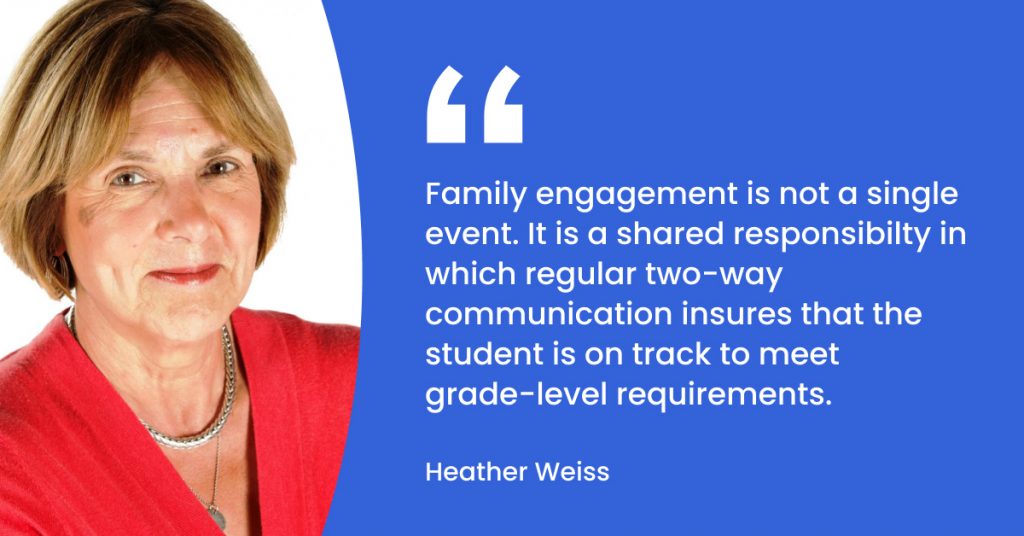Paul J. Meyer, one of the founding members of the self-improvement industry, had the right idea regarding communication. He firmly believed that “Communication – the human connection – is the key to personal and career success.” This is a fact of modern living, and we are all in search of mediums that can facilitate quality communication across various organisational tiers. After all, every aspect of human activity is governed by the communication between two or more parties. The corporate world and government institutions invest heavily to make ordered communication a reality among their correspondence circles. However, there is one vital zone where a visible disconnect exists: Parent Teacher Communication. Educational institutions function on a feedback mechanism and require off-campus support as well. This is where parent and teacher communication play a pivotal role.
What is Parent Teacher Communication
Traditionally, most educational institutions used to conduct parent teacher conferences once or twice a year. However, a student’s progress cannot be condensed to these individual one-off sessions. Parent Teacher communication begins when the student enters a grade and continues until he advances to the next one. It primarily refers to the various ways in which teachers interact with parents. The updates could be in the form of school text messages to parents, emails or even calls.
Parent Teacher communication is an integral aspect of education as it serves as the basis for the holistic development of pupils. The rationale behind the endeavour can be traced back to the inception of modern education systems. However, owing to the advent of technological proliferation, numerous creative ways for teachers to communicate with students have come about. Furthermore, with schools realising the need to foster healthy relations between educators and legal guardians, parent teacher communication has taken centre stage in developmental discussions.
Why is Parent Teacher Communication necessary?
Children spend the majority of their time either at school or home. Recent studies have shown that learning is a socially mediated process, especially for young children between 6 and 13. Therefore, the environment is of significant importance as the child’s cognitive development is incredibly dependent on it. Moreover, education is not confined to a classroom, and all experiences have a marked impact on the child. Naturally, the role models that most pupils look up to are parents and teachers simply because of their exposure to these individuals. So encouraging communication between the two is a logical conclusion.
Parent teacher communication extends beyond just updating academic progress or other forms of messages to parents from teachers. A mutual understanding of trust and cooperation must be established to develop a cohesive ecosystem that allows the child to thrive and get the most out of their formative years. The two-way communication will ensure that the pupil’s school life and home life merge seamlessly. Thus, as children become capable of building a solid wireframe from their experiences, an effective parent teacher communication will ensure progress in all aspects of their lives.
Challenges in Parent Teacher Communication

Despite being one of the most vital pillars of child development, Parent Teacher communication does possess its share of challenges. This occurs primarily due to oversight and can be rectified quite easily. Unfortunately, the issues were thrown into further disarray due to the pandemic as classes have shifted online for the most part. Some of the most gaping holes in Parent Teacher Communication Include:
Scale of communication
An average teacher has around 20 to 40 students under their supervision, and reaching out to each parent can be a logistical nightmare.Technological constraints
The absence of a unified platform to streamline communication networks that enable creative ways for teachers to communicate with parents.Cultural distinctions
Cultural differences are expected in schools’ multi-cultural environments and could manifest as a communication barrier.Low Parental involvement
School timings and work schedules often coincide, and it is highly tedious for parents to follow up on their child’s performance during such periods.Lack of documentation:
Parent teacher communications are usually not logged, making it challenging to trace the problems discussed during the meeting in the future.
10 Tips for Effective Parent Teacher Communication

The challenges outlined above are concerning, but they can be overcome with innovation and planning. The right mindset and tools are all it takes to seal the gaping holes in parent teacher communication. Here are the top 10 tips on how to communicate with parents effectively.
1. Establish a Relationship
The cornerstone of any relationship is trust, and teachers need to ensure that the parents trust them to look after and educate their wards. It starts by establishing a rapport immediately when the teacher is assigned the class. Once the ice is broken initially, a more advanced interaction can follow. Parents must be aware that the teachers have the student’s best interests in mind when communicating their progress. Moreover, teachers and parents have their areas of expertise when it comes to moulding the child, and these niches should be identified and accepted at the onset.
To avoid misunderstandings in the future, teachers should impress upon parents that they have multiple children under their care while parents have only one. This will guarantee that the trust established at the inception will not waver in the future.
2. Be Consistent
Consistency is key to the success of any endeavour, and the same goes for Parent Teacher Communication. Wondering how to communicate with parents as a teacher on a regular basis? The answer lies in planning. Charting out a communication plan with a set frequency will ensure consistent engagement with parents. For example, designing a daily or weekly schedule allotted each day for ‘parent update’ will allow teachers to maintain trust while monitoring the student’s performance more closely. Furthermore, a routine can also help parents get acclimated to the same, enabling a more pleasant experience.

3. Use the Right Tools
There exist numerous creative ways for teachers to communicate with parents. In addition to school text messages to parents, teachers can employ other means of communication like emails or calls. A more nuanced approach would be to employ school communication apps like Schoolvoice, all under one platform. They allow you to communicate student activities from one place and enable teachers to share details of their progress in various formats such as PDF or JPEG. To top it off, school communication apps like Schoolvoice come with their security features, allowing all parties to maintain privacy regarding the shared information. These apps also come with central admin provision so that school management can oversee the entire process. School communication apps are probably the most powerful tools in a teacher’s arsenal to ensure quality Parent Teacher Communication.
4. Encourage Feedback
Growth can only be initiated if all parties involved work together. Thus, a feedback mechanism should be put in place to ensure that students get the best out of their school life. Teachers should encourage open communication with parents and be willing to receive constructive criticism. An honest back and forth eradicates all pretensions and paves the way for productive development. Suggestions should be considered on their merit and implemented as such. Furthermore, both sides must acknowledge valid points.
The beauty of constructive feedback is that the insights can be used to improve the experience of students in the future as well. School communication apps like Schoolvoice are particularly helpful as this function is already included in its features.
5. Record Communication
Managing multiple students simultaneously is a big ask for teachers. Naturally, certain things can skip their mind making it difficult to follow up on the issues discussed with parents. Having a comprehensive log of the communication will ensure that the points discussed are executed to perfection. School communication apps are tailor-made for this as the history of the communication is available at arm’s length. Documenting the child’s progress can also serve as a morale booster and encourage pupils to keep up the good work. Moreover, a record of all interactions will further facilitate growth and as it would be capable of providing valuable insights.
6. Empathize at all times
Each individual has their own personal battle they are waging, be it career or family-wise. Therefore, the key to effective communication is to show empathy. Teachers need to be aware of this when passing on their pupil’s progress to parents. More importantly, they should focus on the wording of their messages and ensure a positive tone is maintained. The parent teacher meeting message serves as a glimpse into the school life of their kid s. So utmost care must be taken when formulating it with an empathetic tone maintained throughout.

7. Have Strategies at the Ready
Parents often turn to teachers for advice and their concerns are typically universal. It is good to have strategies prepared beforehand in order to provide quick and effective advice. This also aids in building trust. Having strategies at the ready will also allow for faster execution which is quite beneficial in the long run. Also, use the feedback received to update these strategies to face newer challenges. It is good practice to check up on how these strategies are panning out so that teachers can smoothen out the rough edges in real-time.
8. Encourage Engagement
Most parents would be a tad reluctant to be involved in their child’s school life as they might feel they are encroaching on the teacher’s domain. This is, however, not conducive to development and the mindset does require a change. Teachers should encourage more engagement and welcome parents to be more involved in their kid’s school life. Organizing regular in-person meetings along with involving them in activities outside class will definitely make Parent Teacher communication more efficient.
9. Personalize Interactions
Each student is unique in their abilities. They require different kinds of attention for their academic and personal development. This should reflect in Parent Teacher Communication as well. Strategies that worked for one child may not always be the ideal option for another. Tailoring the content of the Parent Teacher interactions is, therefore, quite important. Personalization also extends beyond the confines of school. For instance, some parents may not work the typical 9 to 5 job. In such cases, meeting times may have to be modified to incorporate this. Also, some households will have both parents working full-time while others have only one parent pursuing such a career. Communication and the content behind it should be personalized to mirror these lifestyles.
10. Get Creative
Repetition stimulates boredom and its human tendency to become numb to such inputs. The same applies to communication. So, what are the creative ways for teachers to communicate with parents? The solution is to mix things up. For instance, if the weekly reports are sent as text messages, break that routine and send a graphical representation of the student’s progress instead. That will make the update more appealing for parents and they are more likely to be responsive towards it. Additionally, teachers could use diverse mediums such as emails and phone calls to break the monotony. Providing actionable information in a format that incites interactions like an RSVP to a school event is another way to stimulate a response and encourage parents to be more involved.
Conclusion
Parent Teacher communication is absolutely essential to the development of students. The simple techniques outlined earlier can drastically improve the efficiency of communication between educators and guardians. With the Pandemic disrupting the traditional delivery of education, school communication apps like Schoolvoice have become integral for parents to remain updated on the performance of their children. These apps provide a great deal of flexibility and are easy to incorporate into existing workflows. To cap it off, these apps encourage parents to be more involved in their child’s academic life. School is the environment that defines an individual’s cognitive years and it is crucial that continuous and regular communication between parents and teachers are maintained throughout.










